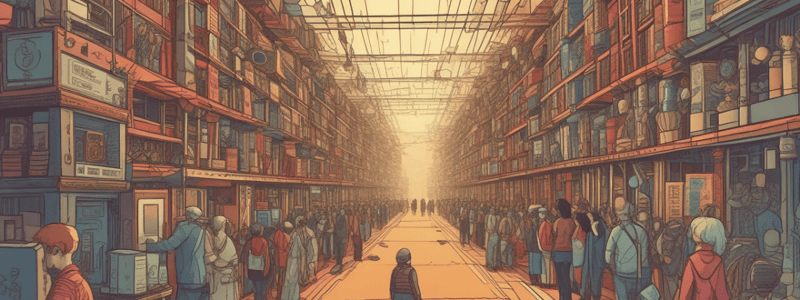Podcast
Questions and Answers
What is one of the main reasons why society needs a medical institution?
What is one of the main reasons why society needs a medical institution?
- To encourage innovation and progress
- To continue from one generation to the next
- To ensure people are healthy and cared for (correct)
- To create artificial creations to benefit humanity
What is the term used to describe the social structures that continue on without regard to any individual?
What is the term used to describe the social structures that continue on without regard to any individual?
- Institutions (correct)
- Social systems
- Communities
- Organizations
According to the conservative view, how do institutions form?
According to the conservative view, how do institutions form?
- Through artificial creations to benefit humanity
- Through the redesign of existing institutions
- Through social structures that continue without regard to individuals
- Naturally from the activities of humans (correct)
What is the primary difference between how a sociologist and an average person view the term 'institution'?
What is the primary difference between how a sociologist and an average person view the term 'institution'?
What is the common thread among institutions such as governments, families, and hospitals?
What is the common thread among institutions such as governments, families, and hospitals?
What is the progressive view of institutions?
What is the progressive view of institutions?
What is one example of an institution that forms naturally from the activities of humans?
What is one example of an institution that forms naturally from the activities of humans?
What is the primary function of the family institution?
What is the primary function of the family institution?
What is the role of institutions in a society?
What is the role of institutions in a society?
What would happen if all the laws in a community disappeared?
What would happen if all the laws in a community disappeared?
What is an example of how institutions affect individuals?
What is an example of how institutions affect individuals?
Do institutions need individuals to function?
Do institutions need individuals to function?
What is the relationship between institutions and individuals?
What is the relationship between institutions and individuals?
What do institutions meet in a society?
What do institutions meet in a society?
What is a key feature of institutions?
What is a key feature of institutions?
What is a consequence of institutions continuing to exist even after an individual is gone?
What is a consequence of institutions continuing to exist even after an individual is gone?
What is the primary purpose of institutions in a society?
What is the primary purpose of institutions in a society?
What would be a likely consequence of institutions disappearing from a society?
What would be a likely consequence of institutions disappearing from a society?
What is a key characteristic of institutions?
What is a key characteristic of institutions?
Why do institutions need individuals?
Why do institutions need individuals?
What is the relationship between institutions and individuals?
What is the relationship between institutions and individuals?
What is the primary purpose of institutions, according to the conservative view?
What is the primary purpose of institutions, according to the conservative view?
What is the key difference between institutions and individuals, according to the sociologist's perspective?
What is the key difference between institutions and individuals, according to the sociologist's perspective?
What is the primary implication of institutions continuing to exist beyond the lifespan of individuals?
What is the primary implication of institutions continuing to exist beyond the lifespan of individuals?
What is the primary difference between the progressive view and the conservative view of institutions?
What is the primary difference between the progressive view and the conservative view of institutions?
What is the primary role of institutions in society, according to the sociologist's perspective?
What is the primary role of institutions in society, according to the sociologist's perspective?
What is a common characteristic of social institutions such as governments, families, and hospitals?
What is a common characteristic of social institutions such as governments, families, and hospitals?
Which of the following is an example of a social institution that benefits society?
Which of the following is an example of a social institution that benefits society?
What is the core difference between the conservative and progressive views of institutions?
What is the core difference between the conservative and progressive views of institutions?
What do sociologists consider to be institutions?
What do sociologists consider to be institutions?
What is a key implication of institutions continuing to exist beyond the lifespan of individuals?
What is a key implication of institutions continuing to exist beyond the lifespan of individuals?
What would happen to daily life if all laws in a community disappeared?
What would happen to daily life if all laws in a community disappeared?
Why do institutions need individuals?
Why do institutions need individuals?
What is a key characteristic of institutions?
What is a key characteristic of institutions?
What do institutions fulfill in a society?
What do institutions fulfill in a society?
What is an imbalance between institutions and individuals?
What is an imbalance between institutions and individuals?
Flashcards are hidden until you start studying
Study Notes
Institutions in Society
- Institutions are essential parts of any society, providing structure and guiding individual behavior.
- Examples of institutions include police stations, schools, hospitals, and businesses like Walmart and Trader Joe's.
Importance of Institutions
- Institutions impose rules and regulations that shape individual behavior, ensuring a sense of order and stability in society.
- Without institutions, individuals would have to navigate a lack of structure, leading to chaos and disruption.
Institutions and Individuals
- Institutions need individuals to contribute and function, but they do not typically need any one random individual.
- Institutions are created by groups of individuals, but they will continue to exist even after an individual is gone, resulting in an imbalance between institutions and individuals.
Purpose of Institutions
- Institutions meet the needs of society by fulfilling expected roles and behaviors.
- Examples include the family institution, which ensures the continuation of society through future generations, and the medical institution, which keeps people healthy.
Views of Institutions
- There are two views of institutions: conservative and progressive.
- The conservative view sees institutions as natural, positive byproducts of human nature, while the progressive view sees them as artificial creations that need to be redesigned to be helpful to humanity.
Sociological Definition of Institutions
- To a sociologist, an institution refers to social structures such as governments, families, hospitals, schools, the legal system, religion, and businesses.
- These institutions continue to exist and function regardless of individual involvement or turnover.
Institutions in Society
- Institutions are essential parts of any society, providing structure and guiding individual behavior.
- Examples of institutions include police stations, schools, hospitals, and businesses like Walmart and Trader Joe's.
Importance of Institutions
- Institutions impose rules and regulations that shape individual behavior, ensuring a sense of order and stability in society.
- Without institutions, individuals would have to navigate a lack of structure, leading to chaos and disruption.
Institutions and Individuals
- Institutions need individuals to contribute and function, but they do not typically need any one random individual.
- Institutions are created by groups of individuals, but they will continue to exist even after an individual is gone, resulting in an imbalance between institutions and individuals.
Purpose of Institutions
- Institutions meet the needs of society by fulfilling expected roles and behaviors.
- Examples include the family institution, which ensures the continuation of society through future generations, and the medical institution, which keeps people healthy.
Views of Institutions
- There are two views of institutions: conservative and progressive.
- The conservative view sees institutions as natural, positive byproducts of human nature, while the progressive view sees them as artificial creations that need to be redesigned to be helpful to humanity.
Sociological Definition of Institutions
- To a sociologist, an institution refers to social structures such as governments, families, hospitals, schools, the legal system, religion, and businesses.
- These institutions continue to exist and function regardless of individual involvement or turnover.
Institutions in Society
- Institutions are essential parts of any society, providing structure and guiding individual behavior.
- Examples of institutions include police stations, schools, hospitals, and businesses like Walmart and Trader Joe's.
Importance of Institutions
- Institutions impose rules and regulations that shape individual behavior, ensuring a sense of order and stability in society.
- Without institutions, individuals would have to navigate a lack of structure, leading to chaos and disruption.
Institutions and Individuals
- Institutions need individuals to contribute and function, but they do not typically need any one random individual.
- Institutions are created by groups of individuals, but they will continue to exist even after an individual is gone, resulting in an imbalance between institutions and individuals.
Purpose of Institutions
- Institutions meet the needs of society by fulfilling expected roles and behaviors.
- Examples include the family institution, which ensures the continuation of society through future generations, and the medical institution, which keeps people healthy.
Views of Institutions
- There are two views of institutions: conservative and progressive.
- The conservative view sees institutions as natural, positive byproducts of human nature, while the progressive view sees them as artificial creations that need to be redesigned to be helpful to humanity.
Sociological Definition of Institutions
- To a sociologist, an institution refers to social structures such as governments, families, hospitals, schools, the legal system, religion, and businesses.
- These institutions continue to exist and function regardless of individual involvement or turnover.
Studying That Suits You
Use AI to generate personalized quizzes and flashcards to suit your learning preferences.




